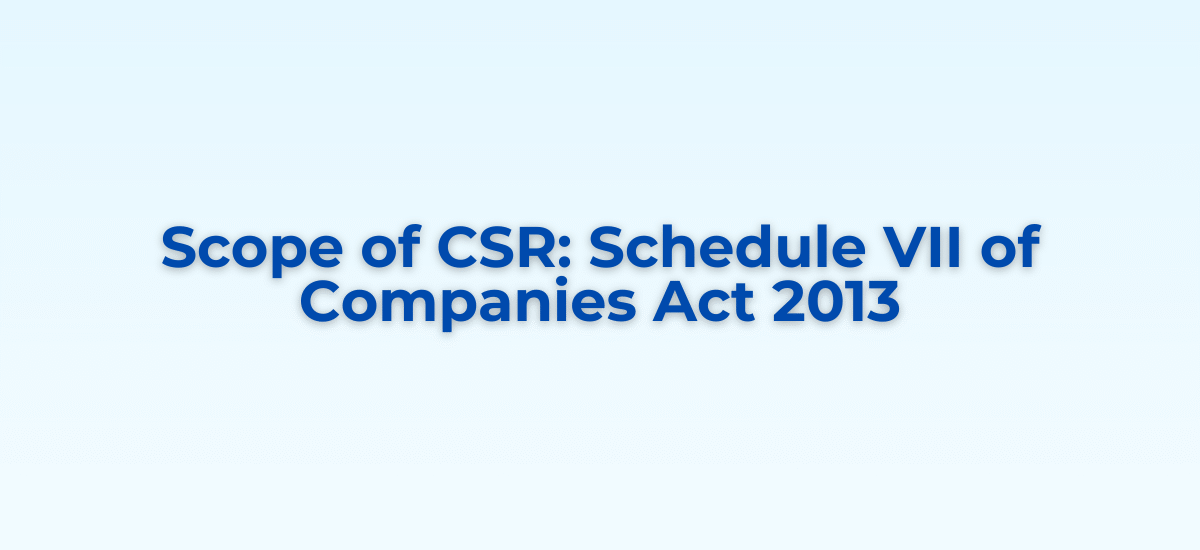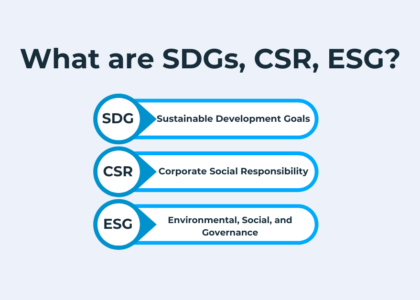India is the first country for mandating the provisions relating to Corporate Social Responsibility. Section 135 of the Companies Act, 2013 stipulates the provisions pertaining to Corporate Social Responsibility (CSR). Through this section a legal obligation was imposed on a corporate entities to tackle the socio-economic and environmental challenges confronting the nation. The objective of CSR provisions is to involve the companies as partners in the social development process by allocating a portion of their profits to social and environmental causes & to bring accountability among companies through Ethical Responsibility, transparency, Community Welfare, Sustainable Development.
When companies channel their efforts into giving back, the impact is huge. It leads to benefits in return such as positive corporate image, employee engagement & retention, improved competitive advantage and consumer growth, more investments, economic progress, etc. As per Section 135 every company including its holding or subsidiary, and a foreign company having its branch office or project office in India having net worth of Rupees 500 crore or more;
or turnover of Rupees 1000 crore or more; or net profit of Rupees 5 crore or more, in the immediately preceding financial year is required to comply with the CSR provisions. The obligated companies are obliged to spend at least 2% of their average net profit of the immediately preceding three financial years on CSR activities.
Which activities does qualify as CSR activities?
The activities which may be included by companies in their CSR policies are listed in Schedule VII of the Act. Schedule VII of the Companies Act 2013 serves as an essential element of the Corporate Social Responsibility framework. It provides clarity and serves as a guide for companies to decide on CSR activities or projects.
Schedule VII
Activities are broadly categorized in twelve areas which may be included by companies in their Corporate Social Responsibility Policies Activities relating to:
- Healthcare & Poverty- Eradicating hunger, poverty and malnutrition, (“promoting health care including preventive health care”) and sanitation including contribution to the Swach Bharat Kosh set-up by the Central Government for the promotion of sanitation and making available safe drinking water.
- Education & skills development- Promoting education, including special education and employment enhancing vocation skills especially among children, women, elderly and the differently abled and livelihood enhancement projects.
- Gender Equality & Empowerment- Promoting gender equality, empowering women, setting up homes and hostels for women and orphans; setting up old age homes, day care centres and such other facilities for senior citizens and measures for reducing inequalities faced by socially and economically backward groups
- Environment- Ensuring environmental sustainability, ecological balance, protection of flora and fauna, animal welfare, agroforestry, conservation of natural resources and maintaining quality of soil, air and water including contribution to the Clean Ganga Fund set-up by the Central Government for rejuvenation of river Ganga
- National Heritage, Art and Culture- Protection of National heritage, art and culture including restoration of buildings and sites of historical importance and works of art; setting up public libraries; promotion and development of traditional art and handicrafts
- Armed Forces- Measures for the benefit of armed forces veterans, war widows and their dependents, Central Armed Police Forces (CAPF) and Central Para Military Forces (CPMF) veterans, and their dependents including widows
- Sports: Activities for training to promote rural sports, nationally recognized sports, paralympic sports and Olympic sports
- Relief Fund: Contribution to the prime minister’s national relief fund or Prime Minister’s Citizen Assistance and Relief in Emergency Situations Fund (PM CARES Fund)] or any other fund set up by the central govt. for socio economic development and relief and welfare of the schedule caste, tribes, other backward classes, minorities and women
- Technology incubators- Contribution to incubators or research and development projects in the field of science, technology, engineering and medicine, funded by the Central Government or State Government or Public Sector Undertaking or any agency of the Central Government or State Government. Contributions to public funded Universities; Indian Institute of Technology (IITs); National Laboratories and autonomous bodies established under Department of Atomic Energy (DAE); Department of Biotechnology (DBT); Department of Science and Technology (DST); Department of Pharmaceuticals; Ministry of Ayurveda, Yoga and Naturopathy, Unani, Siddha and Homoeopathy (AYUSH); Ministry of Electronics and Information Technology and other bodies, namely Defense Research and Development Organisation (DRDO); Indian Council of Agricultural Research (ICAR); Indian Council of Medical Research (ICMR) and Council of Scientific and Industrial Research (CSIR), engaged in conducting research in science, technology, engineering and medicine aimed at promoting Sustainable Development Goals (SDGs)
- Projects for Rural development
- Projects for Slum area development
- Disaster management- Activities for disaster management, relief, rehabilitation and reconstruction activities
Can CSR expenditure be incurred on activities beyond Schedule VII?
The MCA has clarified via Frequently Asked Questions (FAQs) dated 12 th January 2016 on CSR expenditure be spent on the activities beyond Schedule VII or not. The statutory provision and provisions of CSR Rules, 2014, is to ensure that activities undertaken in pursuance of the CSR policy must be relatable to Schedule VIl of the Companies Act, 2013 as per General Circular No. 21/2014 dated June18, 2014. Further, as per General Circular No. 14 /2021 dated 25 th August 2021 for FAQs on CSR, MCA has clarified that CSR expenditure cannot be incurred on activities beyond Schedule VII of the Act. The activities undertaken in pursuance of the CSR policy must be relatable to Schedule VII of the Companies Act, 2013. The items enlisted in the Schedule VII of the Act are broad-based and are intended to cover a wide range of activities. The entries in the said Schedule VII must be interpreted liberally to capture the essence of the subjects enumerated in the said Schedule.
Is there any list of activities which does not qualify as eligible CSR activity?
The definition for the term Corporate Social Responsibility (CSR) is given under Rule 2 of The Companies (Corporate Social Responsibility Policy) Rules, 2014, which states list of six activities that do not qualify as eligible CSR activities: –
(a) Activities undertaken in pursuance of normal course of business of the company.
(b) Activities undertaken outside India, except for training of Indian sports personnel
representing any State or Union Territory at national level or India at international level.
(c) Contribution of any amount, directly or indirectly, to any political party under section
182 of the Act.
(d) Activities benefitting employees of the company as defined in section 2(k) of the
Code on Wages, 2019.
(e) Sponsorship activities for deriving marketing benefits for products/services.
(f) Activities for fulfilling statutory obligations under any law in force in India.
Transfer of unspent amount of CSR to specified funds
The compliance of CSR is fulfilled when the company spends the prescribed amount as per its obligation. However, if the company fails to spend the requisite amount within the financial year pertaining to ongoing project and other than ongoing project, it shall fulfil its obligation as given under section 135.
For ongoing CSR projects, within 30 days from the financial year end, open a special account in any scheduled Bank named as “Unspent CSR account” and transfer such amount. The Company must shall spend such transferred funds within a period of three financial years from the date of such transfer in the Scheduled Bank account.
After three financial years, if anything remains unspent the same need to be transferred to a Fund specified in Schedule VII, within a period of 30 days from the date of completion of the third financial year.
For activities / programs other than ongoing projects, within 6 months from financial year end, transfer the unspent amount to a fund specified under Schedule VII:
(i) Swachh Bharat Kosh
(ii) Clean Ganga Fund
(iii) Prime Minister’s National Relief Fund (PMNRF) (iv)
(iv) Prime Minister’s Citizen Assistance and Relief in Emergency Situations Fund (PM CARES Fund)
(v) Any other fund set up by the Central Government and notified by the Ministry of
Corporate Affairs, for socio-economic development and relief and welfare of the Scheduled Castes, the Scheduled Tribes, other backward classes, minorities and women. (FAQ 3.15 of General Circular No. 14 /2021)






